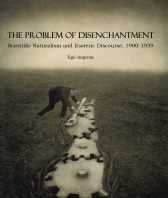Another quick post in the category “me rambling in online interview”: Last week I appeared on Erik Davis‘ “Expanding Mind” podcast, speaking about esotericism and cognitive science, the problem of disenchantment, parapsychology, role-playing games, and AI. The whole conversation is now audible at TechGnosis.com – for those not faint of heart.
The end of EXESESO
After the untimely death of Nicholas Goodrick-Clarke back in 2012 (see obituary in The Times, and by Christopher McIntosh in Aries [pay-wall]) , there has been much speculation about what would happen with the Exeter Centre for the Study of Esotericism (EXESESO) that he ran at the University of Exeter. Since 2005, EXESESO has offered one of the three official university programs for the academic study of esotericism in Europe (the others being in Amsterdam and Paris), and produced a steady stream of MAs through its distance learning program. After an internal evaluation process at Exeter University, in dialogue with the Theosophically oriented Blavatsky Trust who funded the centre, a final decision has now been made to shut EXESESO down. Mark Sedgwick reports on the decision in the Spring 2014 ESSWE newsletter, which was released today:
Quantitative heterodoxology
 Last week Science published an article introducing the term “culturomics” – the quantitative study of cultural trends. By constructing a database out of the by now 15 million books that Google have digitized over the past years, a Harvard based research team led by Jean-Baptiste Michel have created a powerful searchable tool which makes it possible to create quantitative date for analysing cultural trends. As they state in the abstract:
Last week Science published an article introducing the term “culturomics” – the quantitative study of cultural trends. By constructing a database out of the by now 15 million books that Google have digitized over the past years, a Harvard based research team led by Jean-Baptiste Michel have created a powerful searchable tool which makes it possible to create quantitative date for analysing cultural trends. As they state in the abstract:
We constructed a corpus of digitized texts containing about 4% of all books ever printed. Analysis of this corpus enables us to investigate cultural trends quantitatively. We survey the vast terrain of ‘culturomics,’ focusing on linguistic and cultural phenomena that were reflected in the English language between 1800 and 2000. We show how this approach can provide insights about fields as diverse as lexicography, the evolution of grammar, collective memory, the adoption of technology, the pursuit of fame, censorship, and historical epidemiology. Culturomics extends the boundaries of rigorous quantitative inquiry to a wide array of new phenomena spanning the social sciences and the humanities.
In short, this is a tool which has the potential to revolutionise research methods in a vast number of fields. The best part: Google Labs have made the tool (the Ngram viewer) publicly available. Before even starting reading the article I found myself thinking about a number of applications for my own research and field. Below follow some rough examples, and preliminary results which already seem to challenge established knowledge in the history of esotericism.
The Divided Lands of Mesmeria
As part of a course I am teaching together with Dr. Marco Pasi we have spent the last three weeks discussing the significance of Mesmerism and animal magnetism in the overlapping contexts of Enlightenment science and esotericism. It is an interesting topic in many respects. For starters, the status of Mesmerism is not uncontroversial in esotericism studies. Why?
Welcome to a prospective blog of intellectual weirdness
As a PhD student who does research on the intersection of several strands of Western history – i.e. the history of Western esotericism, the history of science, and the history of religions – I come across a whole lot of intellectual weirdness on a daily basis. This blog is intended as a place to share some of the perplexing, bizarre, but always deeply fascinating curiosities of human thought and knowledge that I encounter. The style will be somewhere between a research blog, commenting on academic research into the undercurrents of Western intellectual history, both my own and that of others, and a place for general commentary and debate of semi-relevant issues that may arise. After all, the media is a treasure-trove of ostensibly “heterodox” religion and science these days, which may warrant the occasional comment. (more…)






